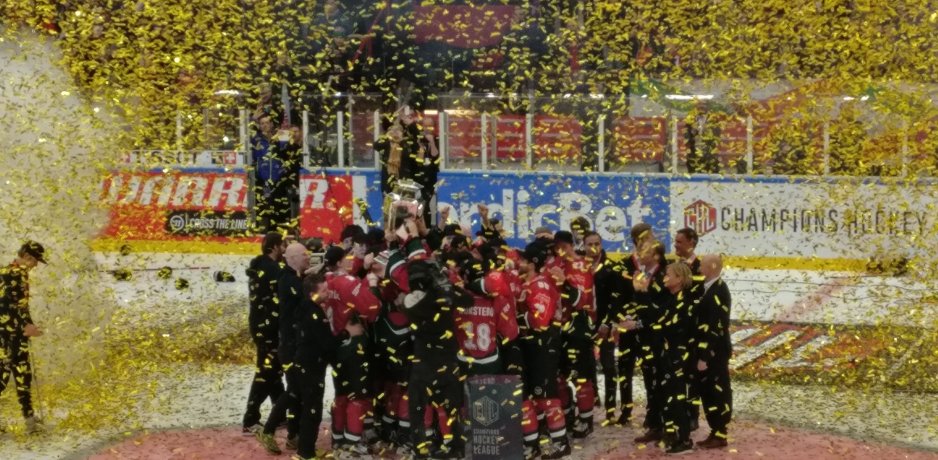European club hockey needs a successful CHL

The Champions Hockey League is about to open its fourth season. It is necessary for the well-being of European hockey that the CHL makes progress, becomes successful and eventually the engine for the clubs, just as the European competition has been for teams in football, basketball and handball for many years.
The success formula of all European cups throughout the years – regardless of sport and adjustments in format – is very well-known by now. Ever since football’s old European Cup for national champions started in 1955, it has relied on exclusivity – a tournament for the best. You need to accomplish something very good at home to qualify for Europe.
Once there, you represent your country, your league, your town, your region and your club. In the early years, only national champions were qualified for the top European cups. Today, fans and other stakeholders have accepted that the best leagues are represented with multiple teams, but participation is still based on certain accomplishment criteria in your national league. This is the case nowadays in all major European team sports and their respective club competitions.
So the format changes which the Champions Hockey League introduced for Year IV are good, and necessary. Regardless of any ownership structure, a club now has to qualify to play in the CHL. It has increased the quality and sportive credibility of the league. As a consequence of this format change, former bastions of European club hockey like Sweden’s Färjestad or Finland’s Kärpät, just to take two examples, are not taking part in this season’s CHL. The slimming down from 48 to 32 teams underlines the exclusivity aspect and it also makes the league easier to oversee.
Critics claim that a pan-European club competition does not work in hockey and their reason would be that the national and regional rivalries are so strong that fans and media have little or no interest in international competition. This is not correct. The reason why European club competition has been a challenge is that the concept has never really been established. It is difficult to like something that you don’t know.
The reason why hockey is the lone major European team sport that has not been successful in establishing such a competition over the years is a separate story for another day. But just looking at the history, one will understand why.
The original European Cup for national champions was established in 1966 and was never successful although it actually lasted for 30 years. But the tournament was heavily dominated by Soviet teams – perennial Soviet champion CSKA Moscow won 20 European titles between 1969 and 1990 – and the clubs from other countries saw almost no chances of winning it. Low attendance and very little attention from media contributed to the eventual folding of the event.
The European Cup was replaced in 1997 by the European Hockey League. It carried a modern format, it was fairly well promoted, but also heavily underfunded. Clubs continued to lose financially, as whatever the clubs earned in gate and prize money could not cover the costs. The EHL lasted only four seasons and it ceased operations in 2000.
It took another five years before the IIHF relaunched a competition for the champions of Europe, this time in a “Super Six” long-weekend format. The European Champions Cup (ECC) presented some excellent hockey between the champions from top six ranked European leagues, but all four events (2005 – 2008) were held in St. Petersburg, Russia in early January and the tournament never became a big hit in the rest of Europe.
But the ECC became an inspiration for the first edition of the Champions Hockey League, which was launched in 2008. This time, Europe’s prime club competition carried some serious prize money, it was beautifully branded, well presented and clubs, fans and media alike were excited. It ended with one of the most memorable finals in European hockey history when the underdog Zurich Lions defeated Russian champion Metallurg Magnitogorsk 5-0 at home after a 2-2 draw away, both games before packed buildings.
Unfortunately, only days after the conclusion of the inaugural CHL season the main investors pulled out. What looked so good was over almost before it started. So once again, European club hockey had failed to sustain a top-level competition.
But although not financially successful, what the previous events have nevertheless shown is that when top clubs of Europe are presented with a stage on which perform, the competition is excellent. Just ask any ZSC fan about the 2009 final against Metallurg and they will tell you that this was a game they will never forget. The Zurich club could have sold out two buildings.
The second coming of the Champions Hockey League has also given the fans a lot to cheer about, and also an understanding that there is no conflict between regular national league games and international competition. To the contrary, both competitions enhance each other.
Alex Ferguson, the legendary manager of Manchester United, was once asked by a reporter what he would rather win, the English league title or the Champions League trophy. Sir Alex looked at the reporter as if he did not understand the question and answered: “I want to win both.”
The same approach in hockey is currently best represented by the Frölunda Indians, who have been in all three CHL finals (2015-2017) and won two of them. Roger Rönnberg – named as Coach of the Year at the E.H.C. Awards last spring – repeats this every time the issue is brought up: “We want to win every competition we enter. The CHL is great hockey for the fans and a great challenge for our club.”
So entering its fourth season, the Champions Hockey League is an improved product, something which the fans are getting more and more accustomed to and it is receiving a better acceptance from media. Eventually, the CHL will also become financially viable, with increased prize money, which furthermore will increase the enthusiasm of the clubs.
The Champions Hockey League is also essential for the continuous development of European hockey, its clubs and leagues. The CHL presents an amazing opportunity for clubs like Cracovia (POL), Cardiff (GBR), Esbjerg (DEN), Gap (FRA) and Neman Grodno (BLR) to play against European powerhouses from the established hockey nations. The CHL is a calibre of competition which these clubs don’t have in their national leagues. Only by playing the best – which initially includes conceding lopsided losses – can the clubs from the emerging European leagues learn and eventually improve.
Here, the clubs from the top Euro leagues assume the responsibility to grow European club hockey as a whole.
The Champions Hockey League is here to stay. It is up to the fans to embrace it.









